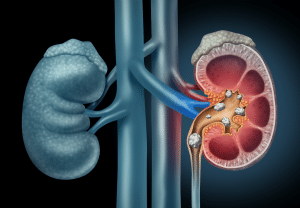
In a word, yes! Fewer things will cause tiredness and fatigue faster than intense psychological or emotional well-being. But why? The answer may not be what you think.
What is Stress-Related Fatigue?
When most people think of fatigue, they think of “adrenal fatigue” – which comes with symptoms like tiredness, lack of motivation, anxiety, sugar cravings, brain fog, and sleep problems. These common health problems have less to do with poor adrenal gland function and more to do with the connection between the brain, gut, immune system, endocrine system, and your mitochondria (the cellular energy generators of your body).
Symptoms Of Stress-Related Exhaustion
There are about 16 mechanisms by which stress can affect your energy levels, and understanding them is vital in finding a solution to chronic fatigue syndrome.
Depletes The Endocannabinoid System
This is a system in your brain, which is responsible for shutting down the body’s stress response and re-establishing homeostasis. 1 When the endocannabinoid system is depleted, we can no longer ward off fear and anxiety. Stress becomes chronic, which allows fatigue to set in. This is arguably the key mechanism of fatigue.
University of Washington neurologist Ethan Russo has done research suggesting that ‘clinical endocannabinoid deficiency’ underlies migraines, fibromyalgia, irritable bowel disease, and a cluster of other degenerative conditions, which may respond favorably to cannabinoid therapies.” 2
Throws Off Neurotransmitters In The Brain
Too much stress affects your mental health and results in imbalances of Serotonin, Dopamine, and Acetylcholine. 3 4 These neurotransmitters are important players in regulating mood, tension, energy, motivation, wakefulness, and cognitive performance. Low levels contribute to depression, anxiety, binge eating, addiction, lethargy, apathy, and anhedonia (inability to take pleasure in life). Chronic stress can also cause GABA resistance. 5 GABA is an inhibitory neurotransmitter that promotes relaxation and rejuvenation. When the brain’s sensitivity to this neurotransmitter is reduced, you have racing thoughts, fears, anxieties, tension, and poor sleep. This again contributes to fatigue.
Decreases Thyroid Hormones 6

The key to energy production, cognitive function, and muscle function. When you have hypothyroidism, all the cells in your body do not produce energy adequately and, as a result, function poorly. Warning signs for an improperly functioning thyroid are shown through fatigue, anxiety disorders, hair loss, fat gain, pain, etc.
HPA Axis Dysfunction
This is the interaction between the hypothalamus-pituitary and adrenal glands. When you are chronically stressed (and the endocannabinoid system is depleted), the HPA Axis becomes chronically activated and starts to dysfunction. It becomes resistant to the negative feedback loops that try to calm the system and is associated with numerous medical conditions including CFS, Fibromyalgia, IBS, Depression, Bipolar Disorder, ADHD, PTSD, SAD and even Alzheimer’s and Diabetes. 7 8 9
Lowers Your Intelligence
Stress can shut down centers in the Prefrontal Cortex, which are responsible for higher thought processes. This allows the amygdala (or Primitive Brain) to take over, resulting in mental paralysis and panic.10 When you lose your higher thinking centers, you also lose self-control and are likely to make poor lifestyle choices, including bad decisions about what food to eat and whether or not to exercise. As poor lifestyle decisions impact energy, this is another way stress can cause fatigue.
Makes You Hungry And Increases Sugar Cravings
Cravings result in poor food choices, which usually include highly processed food, low in protein and fiber, but with a high glycemic load. 11 12 This results in inflammation, which directly suppresses the neurotransmitter Orexin (which is key in regulating wakefulness and energy levels). Ironically, Energy drinks especially sap your energy levels.
Chronic Inflammation
Regulated by the stress hormone cortisol, but over time, chronic stress reduces the effectiveness of cortisol and inflammation gets out of control. 13 Chronic inflammation is linked to almost every disease from heart disease and cancer to depression and Alzheimer’s. It also has a direct impact on energy levels by shutting down Orexin.
Suppresses The Immune System
A suppressed immune system makes us more susceptible to infections. 14 When this happens regularly, the body is overtaxed and suffers from chronic oxidative damage in the cells. Many viruses specifically target the Mitochondria (our energy generators), causing a huge dip in energy production.
Disrupts your Circadian Rhythm and Sleep 15 16
Lack of sleep cause fatigue for most people. When you are stressed, you may have racing thoughts and poor sleep, it takes you longer to fall asleep, and you have less restful slow-wave sleep. Not getting enough quality hours of sleep leads to chronic sleep deprivation and is a risk factor for other issues such as depression, anxiety, daytime sleepiness, and fatigue, as well as increased rates of dozens of diseases.
Makes You Depressed
Mood and energy are very much intertwined. Better moods facilitate better energy and vice versa. Stress can wreck your mood because of its effects on chronic HPA Axis activation 17, imbalances in neurotransmitters 18in the brain, and also from decreasing BDNF (an important peptide in your brain) which keeps your brain healthy. Chronic stress also causes energy regulating areas of your brain to atrophy. 19
Causes Chronic Physical Pain
Stress causes changes in the structure and function of your brain in profound ways. When you have chronic stress, your brain becomes more and more sensitive to sensations of pain. This can get so severe that even normal levels of touch can be felt as pain. Pain itself then causes more stress resulting in a vicious cycle of pain, stress, and fatigue. 20 21.
Lowers many Beneficial Hormones
This includes hormones such as pregnenolone, which is a precursor to both stress and sex hormones. When your body is getting a lot of stress signals, the adrenals “steal” pregnenolone away from being used to make sex hormones like testosterone and progesterone, which have very positive effects on our bodies. 22 When levels of these hormones are reduced, you are more likely to suffer from inflammation, poor mood, weight gain, higher stress and anxiety, and lower energy levels.
Damages your Mitochondria
A little bit of stress, like the kind you get from acute exercise, can be very beneficial to your health but, when stress becomes chronic, you will get oxidative damage. As they say, “it’s the dose that makes the poison.” When Mitochondria are damaged, it directly lowers our cell’s capacity to produce energy. 23 The resulting inflammation also damages parts of the brain (the hypothalamus), which produce neurotransmitters, such as orexin that regulate energy levels.
Causes a Leaky Brain Barrier
By causing immune cells to release histamine and various inflammatory compounds. These chemicals increase the permeability of a normally semi-permeable blood-brain barrier allowing substances that do not normally enter the brain to enter. 24 Inflammation also wreaks havoc on brain areas related to health and energy, resulting in fatigue, depression, numerous brain diseases, and mood disorders.
Stress flushes out Beneficial Minerals from the Kidneys

Stress removes vital nutrients, including potassium and Magnesium, which most of us are already deficient in. Potassium and Magnesium are essential for hundreds of metabolic processes in the body, and depleting these minerals can result in numerous problems, including fatigue, muscle breakdown, irregular heart rhythm, and poor detoxification.
Stress induces a Leaky Gut
Also known as increased gut permeability.25 This causes a number of issues, which include increasing the amount of bacterial toxin (or endotoxin) entering the bloodstream and causing inflammation. This process has been implicated in fat gain, anxiety, depression, autoimmune diseases, stress, and fatigue. 26 It can also cause food sensitivities and intolerances, IBS, SIBO (small intestinal bacterial overgrowth), and gut pain. 27 28
In addition, the inflammation caused by leaky gut directly shuts down Orexin, which decreases your energy levels and makes you feel tired.
Conclusion
There are lifestyle changes that you can implement to help alleviate the symptoms of elevated stress levels. You can use relaxation techniques such as yoga or meditation, consistent physical activity, get enough sleep, surround yourself with loved ones, and eat a well-balanced diet.
It is important to always consult your health care professional if you have severe physical fatigue symptoms as they may want to conduct further testing, but short term solutions may help!
References[+]
| ↑1 | Neuropsychopharmacology (2016). Neurobiological Interactions Between Stress and the Endocannabinoid System. |
|---|---|
| ↑2 | Russo EB. (2008). Clinical endocannabinoid deficiency (CECD): can this concept explain therapeutic benefits of cannabis in migraine, fibromyalgia, irritable bowel syndrome and other treatment-resistant conditions? |
| ↑3 | European Journal of Neuroscience (2000). Chronic psychosocial stress reduces the density of dopamine transporters. |
| ↑4 | Obesity Research (1995). Brain serotonin, carbohydrate-craving, obesity and depression. |
| ↑5 | Joëls M et al. (2003). Hippocampal and hypothalamic function after chronic stress. |
| ↑6 | Indian Journal of Endocrinology and Metabolism (20011). Stress and Hormones. |
| ↑7 | Journal of Psychosomatic Research (2002). Hypothalamic–pituitary–adrenal axis, neuroendocrine factors and stress. |
| ↑8 | Cara Tomas, Julia Newton, and Stuart Watson, “A Review of Hypothalamic-Pituitary-Adrenal Axis Function in Chronic Fatigue Syndrome,” ISRN Neuroscience, vol. 2013, Article ID 784520, 8 pages, 2013. |
| ↑9 | James P. Herman, “Neural control of chronic stress adaptation,” Front. Behav. Neurosci., 08 August 2013. |
| ↑10 | Amy Arnsten et al. “Everyday Stress Can Shut Down the Brain’s Cheif Command Center,” Scientific American, April 2012. |
| ↑11 | Anne Venner et al. “Orexin neurons as conditional glucosensors: paradoxical regulation of sugar sensing by intracellular fuels,” The Journal of Physiology, October 2011. |
| ↑12 | Zhan S et al (2011). “Tumor necrosis factor-alpha regulates Hypocretin system via mRNA degradation and ubiquitination.” |
| ↑13 | Carnegie Mellon University. “How stress influences disease: Study reveals inflammation as the culprit.” Science Daily, 2 April 2012. |
| ↑14 | Segerstrom, Suzanne C, and Gregory E Miller. “Psychological stress and the human immune system: a meta-analytic study of 30 years of inquiry.” Psychological bulletin vol. 130,4 (2004): 601-30. doi:10.1037/0033-2909.130.4.601 |
| ↑15 | Steinach M., Gunga HC. (2012) Circadian Rhythm and Stress. In: Chouker A. (eds) Stress Challenges and Immunity in Space. Springer, Berlin, Heidelberg. |
| ↑16 | Survjit Cheeta et al, “Changes in sleep architecture following chronic mild stress.” Biological Psychiatry, February 1997. |
| ↑17 | Allison T. Knoll, William A. Carlezon, Jr. “Dynorphin, stress, and depression.” Brain Res. Author manuscript; available in PMC 2011 Feb 16. |
| ↑18 | Isovich E1, Mijnster MJ, Flügge G, Fuchs E. “Chronic psychosocial stress reduces the density of dopamine transporters.” Eur J Neurosci. 2000 Mar;12(3):1071-8 |
| ↑19 | Conrad, Cheryl D. “Chronic stress-induced hippocampal vulnerability: the glucocorticoid vulnerability hypothesis.” Reviews in the neurosciences vol. 19,6 (2008): 395-411. |
| ↑20 | Marwan N. Baliki et al, “Chronic Pain and the Emotional Brain: Specific Brain Activity Associated with Spontaneous Fluctuations of Intensity of Chronic Back Pain.” J Neurosci. 2006 Nov 22. |
| ↑21 | Chapman CR1, Tuckett RP, Song CW, “Pain and stress in a systems perspective: reciprocal neural, endocrine, and immune interactions.” J Pain. 2008 Feb 9. |
| ↑22 | Gao L1 et al, “Regulation of estradiol and progesterone production by CRH-R1 and -R2 is through divergent signaling pathways in cultured human placental trophoblasts.” Endocrinology, 2012 Oct. |
| ↑23 | Vicario, M et al. “Chronic psychosocial stress induces reversible mitochondrial damage and corticotropin-releasing factor receptor type-1 upregulation in the rat intestine and IBS-like gut dysfunction.” Psychoneuroendocrinology, 2012. |
| ↑24 | Theorides TC et al. “Corticotropin-releasing hormone and the blood-brain-barrier.” Front Biosci. 2007. |
| ↑25 | Vanuytsel T et al. “Psychological stress and corticotropin-releasing hormone increase intestinal permeability in humans by a mast cell-dependent mechanism.” Gut, 2014 Aug. |
| ↑26 | de Punder, Karin, and Leo Pruimboom. “Stress induces endotoxemia and low-grade inflammation by increasing barrier permeability.” Frontiers in immunology vol. 6 223. 15 May. 2015, doi:10.3389/fimmu.2015.00223 |
| ↑27 | Fukudo S, Nomura T, Hongo M Impact of corticotropin-releasing hormone on gastrointestinal motility and adrenocorticotropic hormone in normal controls and patients with irritable bowel syndrome Gut 1998;42:845-849. |
| ↑28 | Fukudo S. “Role of corticotropin-releasing hormone in irritable bowel syndrome and intestinal inflammation.” Journal of Gastroenterology, 2007. |




